Quintessential Bollywood outsider Taapsee Pannu breaks down her craft, speaks about her early life, entry into films and, of course, explains everything you want to know about her unusual name

Taapsee Pannu
Your uniqueness in showbiz starts with your name itself. Do you know any other Taapsee Pannu in the world?
I know Tapsi.
ADVERTISEMENT
Double-A, P, S, and double-E?
On all my legal documents, my dad actually kept my name as T-A-P-A-S-E-E.
That's what's in your passport?
Yes. By the time I was old enough to say, "Dad, please don't do this to me," it was too late. T-A-P-S-I, for him, in numerology, wasn't good enough. It needed to have two Es, and an extra A, for some weird reason. That's T-A-P-A-S-E-E (my name). In school, during roll call, the teacher would stop at roll number 47, and go, "Taa Taa…" Being used to it, I'd just say, "Taapsee Pannu, present ma'am!"
I was not fine with correcting every Indian out there. That it is Tapsi, not Tapa-see. For screen, I just shifted (my dad's) two As, to make it Taapsee!
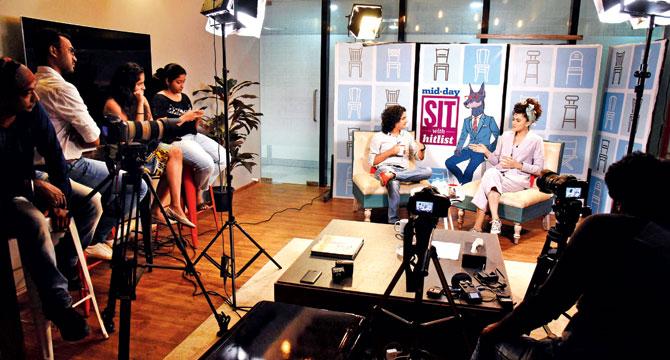
Taapsee Pannu in conversation with Mayank Shekhar at the latest edition of Sit With Hitlist, before a live audience, at the mid-day office. Pics/Nimesh Dave
Starting out, did no South producer ask you to make it closer to say Jaya Prada?
Thank God. I wasn't ready to change these basic things about myself, for anything, or anyone. And I really like my unique name, among thousands of Poojas and Nehas, who simultaneously turn around, when their names get called!
No knock on Poojas, Nehas, before they started trolling you on Twitter, okay?
I'm used to people going after me on Twitter, so it's fine! But even they would agree, I'm sure.
The other intriguing thing about you is you'd never acted, before hitting the screen — not in even in school/college.
Well, I was pretty dramatic in life, so really didn't need the drama before camera, or audience. I'm a professionally trained dancer. In that sense, performing on stage has been my first love; and I was into public speaking. And I thought why should I pretend to be someone else [with acting]? A teacher did once force me to act on stage, in lieu of allowing me to host the show. I have no memories of that first and last stage experience, other than the fact that I moved back to hosting.
Also Read: Taapsee Pannu: People moving beyond concept of no-brainer films
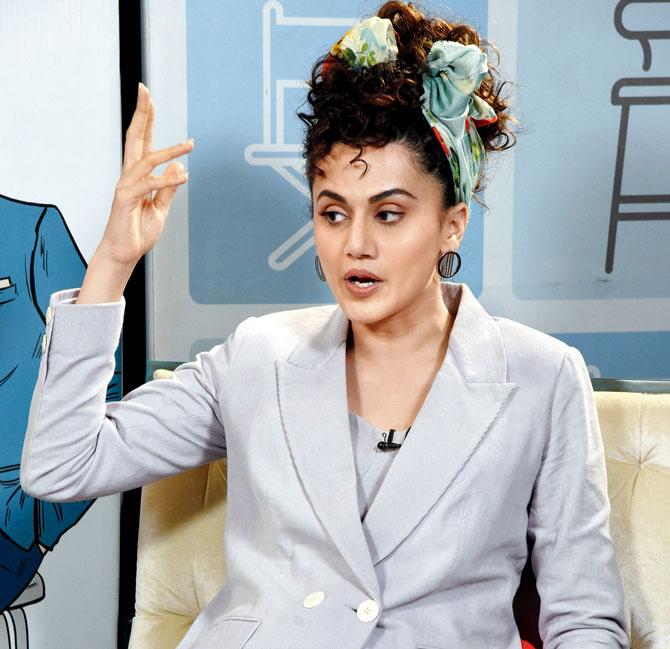
After all that, from Delhi, you land up straight down South, to act; that too in a language you didn't know at all?
I'm an experimentally unpredictable person. Even I don't know what I'm going to do next. During college, my parents would say, "Khud kamaoge, toh pata chalega, paise ki value!" So I said, "Dekh lete hai kamake kaisa hota hai!" I started modelling. It was simple. I could manage with studies, which I never wanted to give up for anything. In third year, I'd already got placed at Infosys. But in my final year, when I took CAT, I had got an 88 percentile. I could work. Or join a B-School. But I knew I could do better [in CAT]. So I decided to take a [gap] year…
Basically IIMs or none?
Yeah, my way or the highway. During that year, being the hyperactive person I am — just sitting at home, studying, was driving me crazy. Modelling went out the window, because it was getting too boring. I had stopped it in my third year itself. And then I began getting calls for films from the South. They get a lot of girls from North, who don't speak the language. They were like, "We can teach, you'll be comfortable." They were more confident about my skills than I was. So I thought fine, let me give it a shot. I wanted to try something different. I went down there with my CAT books, which I couldn't even open, because I was so deeply into those dialogue sheets, in a language I had never heard in my life. I didn't think it was going to be so difficult.
Back in the day, many Bollywood actors said, "1 2 3 4," for dialogues in the South.
Even I've heard that. I can't. I can't take prompting either, because it distracts me. Also, I'm a science student, so not good with 'rattofying' lines. I began to learn them by heart, because of which I was one of the first actresses from the North who dubbed for herself in Telugu. I wasn't as consistent with Tamil. But I learnt both.
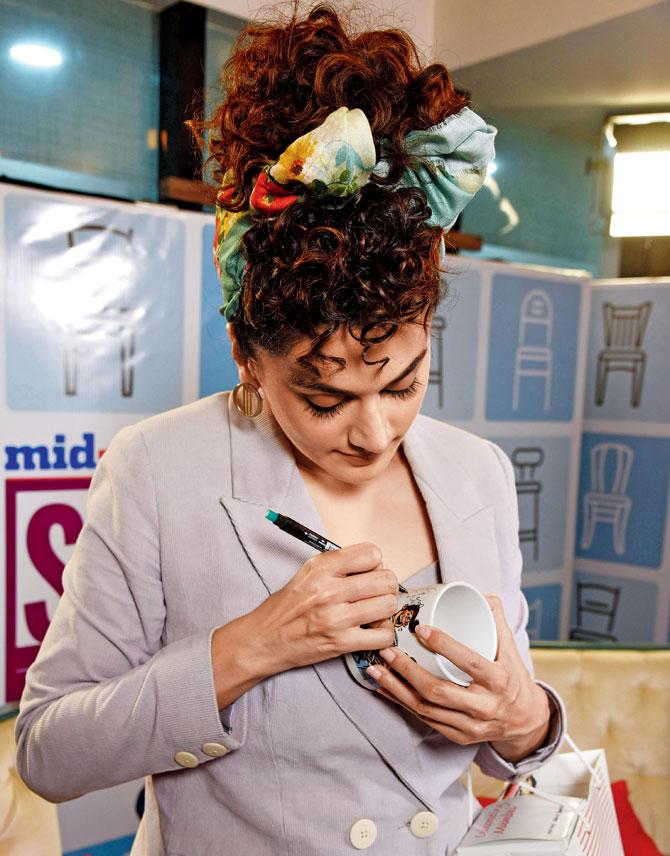
Have seen some of your Tamil interviews. You reply in English.
Yeah, Tamil is only incoming; no outgoing. But Telugu, it happens both ways!
[Speaking of languages], you graduated in computer engineering.
Yes, I loved the study part of it. Basically I was a proud front-bencher, whenever I was in class, answering questions, following up with what's happening. This was of course rare. Because I was always outside for some competition, modelling assignment or the other. I have been a jack of all trades, master of none.
Were you the only girl in class?
Imagine that being Taapsee, good for the guys!
[Laughs]. No, there were 12 girls in a class of 60. Not that bad. Yeah, the ratio is quite off. But it's not the same Taapsee Pannu as you're looking at right now. I'm sure they [my classmates] do a double-take every day, when they look at what I'm doing now!
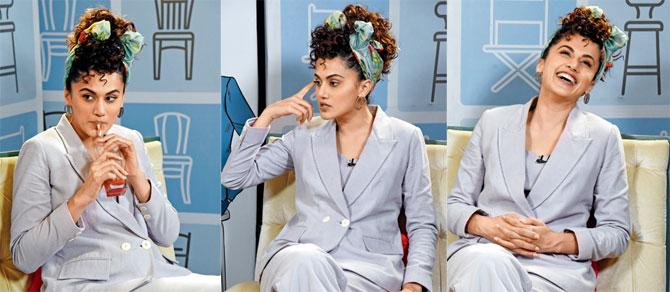
The many moods of the actor as she regales the audience with anecdotes
In that sense, you defy the right-brain [creative], left-brain [analytical skills] theory, where one is supposed to be only strong at either.
Something really crazy happened up here [laughs]. There is a weird kind of balance that has co-existed within me since I was a child. Even now I have a certain bent of mind, where I run certain businesses, and I have fair idea about marketing of films as well. At the same time, I choose films that aren't conventionally market-savvy.
As an actor, you're what they call a 'one-take artiste', where you psyche yourself into becoming a particular person, and it all comes out in an unrepeatable go. Must be scary for the director, right?
I will give a second take. But I warn directors that it probably won't be as good as the first. That is how it is. And that is actually a negative that comes from not being a trained actor. I don't know how to get that [moment] back again. Once I empty myself the first time on, it's very difficult to fill myself up with the same ingredients.
Would you be scared though if they didn't like your first take?
No, because then they'll tell me that I'm going in the wrong direction. And that is a totally new thing for me. The scary thing is if there's a technical glitch in a crucial shot that they don't want to get rid of. I've had directors say they're okay —even if slightly out of focus.
Also View Photos: Have you seen these candid pictures of Taapsee Pannu?
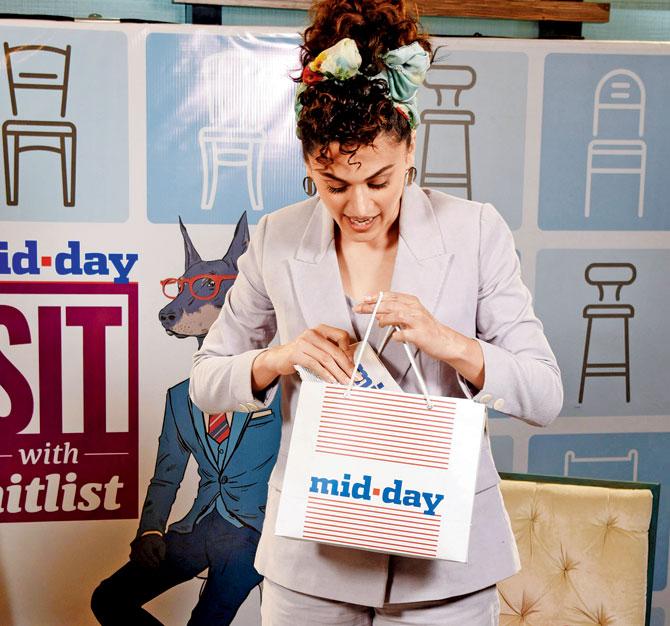
Does it then become harder for you to get in and out of that shot/character as well?
I laugh about the fact that I'm becoming a crazy person, with every film. I rid 90 per cent of a character from my system, and 10 per cent stays, changing something in me.
Give an instance?
I'll give you an example. During Manmarziyaan, my sister and I went out for dinner. We were standing at the pavement, waiting for the driver to get the car. There was a man at the red signal, slyly taking out his camera on a bike. It's not like he asked for a picture. I'm a public figure; not a public property, like Qutub Minar, or something. There's a clear difference.
And you whacked the shit out of him?
I, in Rumi-mode, went, "Phone andar rakh le, nahi toh tod dungi!" My sister was like, "I'm not with her!" I also instantly realised, this is not me.
That guy should be glad you hadn't stepped out of Game Over.
[Laughs] My sister was actually worried after Badla, wondering who I'll kill, once I come back! I knew that's not a good character to bring home. With Game Over, I was getting borderline depressed. I had to keep thinking about my biggest fears, again and again, for 35 days, every single day, for 12 hours. I used to text my sister, since she is my only bouncing board. I don't freak my parents out. It would be quite scary for them to see their daughter going through these mental ups and downs.
Also Read: Game Over Movie Review: Super unnatural thriller!
Have you considered seeing a therapist after a role?
I thought about it couple of times. But I go on a vacation after every film as a ritual. If I feel it [the character] is still not leaving me, I will. Until now, it's been fine.
What happened after Pink? That's another character, who's been through trauma.
Before Pink, I never thought I could cry without glycerine. I never used glycerine in Pink. During that shoot in Delhi, thankfully, I was staying with parents. It was all fine. But after the film got over, I would cry at the drop of a hat. I'd look at a beggar, and cry. I'm watching Jana Gana Mana on television, and I'm crying. I don't know what had really changed.
You please take care, okay?
[Laughs] Yeah, I'm trying! I've some really good people around to keep me sane.
Guess movies like Judwaa 2, Chashme Baddoor help too?
A lot! Sometimes in that world, you're made to realise that you don't really belong here. It's almost like a favour that you're [getting to] do this [role]. In this [alternative] side of the world, where most of my filmography belongs, they wonder why I have to succumb, or downgrade [myself] to do that! So either way, I hear shit from both sides. [laughs]. I might be the only one to create that middle path that probably didn't exist before; at least you'll remember me for it.
If one were to look at turning point for Hindi films for you, I'd guess it's literally that kickass introduction scene in Baby. You just unexpectedly popped up like a storm, haven't looked back since. Take us through that scene?
I'd just finished Chashme Baddoor [first Hindi film]; looking for the next. And I wanted to up my game. I'd heard of a film with two girls — one cast opposite Akshay [Kumar] sir; the other, who's an agent, with around 10 minutes on screen, but an action sequence by herself. Something in me suggested I should go after that role. I kept pushing the casting director to fix a meeting with Neeraj [Pandey] sir, who had seen me as a coy, shy girl in Chashme. So obviously I wouldn't qualify. When I met Neeraj sir, he gave me dialogues, that I just read. It was not an audition, otherwise I would've failed. He just spoke to me about my athletic side. I was a lot into sport. Somehow he was convinced.
You'd done martial arts?
No, but I was extremely physically active. So it [martial art] would look natural on someone who's into sport. I began training for martial arts. Now I had this injury from my dancing days. While trying to do a split, I had once injured my ligament. That injury started resurfacing with those high kicks I was practicing for Baby. I was so scared to tell anyone about it, lest I lose that role. So I would train for two hours, then go for physiotherapy for an hour — every day, for six to seven weeks. The first scene we shot for Baby in the Nepal schedule was my fight. There were two days kept for it. We finished it in a day. I had also taken Vitamin B and D injections, to make sure it [the injury] doesn't resurface. After the scene, when I told them about this injury, and how I was so scared to lose the role. They went, "Stupid; we wouldn't have done that!"
That scene might as well be the first to inspire an entire film — Naam Shabana.
Basically I've realised, what works for me, is when people don't expect anything. People did not expect that in an Akshay Kumar film, anyone will have a substantial role. Or even in Pink, for that matter, with Amitabh Bachchan being there.
Mulk as a drama would be a natural follow-up to Pink?
Apart from the courtroom drama, I don't think anything else was similar. I think Pink was very vulnerable. Mulk wasn't.
Did you similarly go as deep into Mulk?
Mulk was more like an inner voice wanting to use my medium's power as an actor to say what I wanted to say. I was the first actor to read the script in Anubhav [Sinha] sir's office. I told him right there that I was on. That last summation dialogue was something I started preparing for in my head from the day I read the script. I was waiting to do that two-pager...
Single take?
Yeah. There were five cameras running together. We had 100-120 junior artistes, given the last day of courtroom sequence. I said, "Just keep [cameras] running, come what may. Call cut, only if there's something drastically going wrong. Otherwise don't." We rolled. A new actor on set started coughing. She didn't know how sync sound works. Or that she could just go out. I finished the whole sequence. Everybody stood up and clapped. It was a surreal moment. A junior artiste handed me a signed note saying "You'll be the number one actress of Bollywood very soon", and left.
What about the cough sound?
Then Anubhav sir walks towards me with the sound designer, and I was like, "I just want to go die, right now. Don't know if I can do this again!" That new actor was in tears. I can't even get angry at her, because poor girl, it's not her fault. I did that shot again. But eventually, Anubhav sir cleaned up [sound], kept the first take!
Was Badla a lot less stressful?
Yeah, I could just 'act', because she [the character] was 'acting' there as Naina Sethi. And I easily knew what I should do to make it look real.
Stupid question, fair warning. If I recall right, there's a scene in Badla, where your co-actor, surprised by some answer of yours, says, "If this is true, then I'm Amitabh Bachchan!" Now if Bachchan already exists in the fictional space the film is in, then you would know it's him when he walks through the door, no?
Nahin! That Amitabh Bachchan is not the Amitabh Bachchan in the head of the person saying that line! It was Manav's [Kaul] impromptu addition to the dialogue; not how it was written. Sujoy [Ghosh] found it very funny. I was, like, whatever, if you guys are fine.
You've called your character in Manmarziyaan the closest to you as a person. Did that make it easier for you to play?
The part that was hard to play was the fact that she goes back to the boyfriend, after getting married. I am not that confused in life. I'm very black and white, with everything. And Rumi is always grey. It was very difficult for me [to get audiences] to root for this character, who is not loyal to the husband. I took it up as a challenge, doing it innocently, but with much conviction. I'm hopelessly loyal as a person.
[Die-hard] romantic type?
I might have dated a lot of people, but I've been 100 per cent there. And if it doesn't work [out], and I feel like going with someone else, I will cut this off completely. And then go. So that overlap didn't make sense to me. What the writer Kanika [Dhillon] told me is that [if it wasn't for that conflict/scene], then it's a cakewalk [for the character]. And I agreed.
I liked that Abhishek Bachchan's Robbie, while being the corporate bore — compared to the happening Vicky (Vicky Kaushal) — wasn't shown to be a complete doofus, given how 'suits' are often stereotyped in popular films. Which of the two would you have picked in real life?
As Taapsee, I would have chosen Robbie any day. I am not comfortable with people who don't really know where their head, hand, and feet are. Vicky was that confused. He just never had a spine. Only had heart.
He'd be more fun to be with.
Yeah, but fun means I can be friends with them. Robbie had a sense of humour at times. And he had this whole thing of, "I am yours; will be yours"—that maturity level to handle someone like Rumi. Robbie was very close to the kind of man I'd want to be with.
You are also an entrepreneur, running a wedding-planning company, invested in a badminton team, which you don't talk about. How do you handle them on a day-to-day basis? [Mohar Basu]
Let me clear this misconception. It is not that I don't talk about it. It's people who don't want to acknowledge and glorify the fact that an actress from a middle-class background is doing this simultaneously. And not because she doesn't believe in her future as an actress. But because she just wants to. Only business magazines end up mentioning it a little bit here and there.
Have you seen the show Made In Heaven; does wedding-planning business really work like that?
[Laughs] The chaos behind organising a wedding and making it look like the way it does is the same. But as far as I know, my company doesn't delve into the personal life of the bride and groom, get them together, or separated... As for day-to-day management, I don't; my sister does. I only go for key meetings. And I'm part of marketing ideas on how to grow the business. With badminton, the tournament and auction happen once a year. I have a proper office working for the rest of the months.
Apparently your team hits bad luck, whenever you're in the stands?
[Laughs] That was happening! And I was sitting in the toilet in the same seat throughout, because we were winning! Trust me it was very difficult to get investors on board for this. I gave some 20-30 odd presentations, and I finally got one investor out of them. It is not easy, just because I'm an actor. But it's helped me grow as a person. I make time for it.
What's the craziest thing a fan has done for you? [Karishma Kakar]
There was this one guy, after my first Telugu film, who just felt like giving me his first salute, before he joined his IPS [police] training. And he did. I don't know why. That was quite crazy.
You've simultaneously worked in Tamil, Telugu [which are also distinct industries], and Hindi films. How different is the kind of reception you get from each?
Very different. In this I can generalise between Tamil and Telugu, to contrast it with Hindi audiences. They [in the South] are very passionate movie fans. Even if you're one or two-film old, and your film has worked, they might not be your diehard fans, but because they are movie fans, they will be crazy about you. Passion for films is that high.
For film stars, no?
You've come in a film; you're a star for them. It's a ritual for them to watch a film every weekend. And they'll give you a chance. It's not like in Hindi, where we get tired telling the public, "Meri picture aa rahi hai, please trailer dekh lo!" Here, only when the word-of-mouth spreads that you take time off your busy schedule, and give the film a chance.
Do you think Hindi audiences have become jaded?
Honestly, don't know the reason.
Do you feel more like a 'star' in Hyderabad/Chennai?
Yeah, you're larger than life, when you are a star, in the South. Here, everybody and anybody who is sitting on a set is a star!
Interesting. Which one would you prefer to be?
I should not complain either way. Because I am getting to live both worlds. If I want to feel like a queen, I can go down South. Or I can just do one Hindi film, and they make me see the reality — that you are nowhere, and you are here only [laughs].
Bollywood makes you feel that? You've spoken about how you still feel like the outsider.
I don't see that as a negative feeling. It is my big USP, or weapon of sorts. My point of view of a lot of characters probably looks real, because I've lived it, and I'm really happy for that. And to an extent I have kept myself away from the social circle of the industry. My day ends at 10 pm, begins at 6.30-7 am...
You sound like Akshay Kumar to me; you also do about four films a year!
I wish. Even if I would've achieved half of what he has, I'll retire. Also, I really don't want those conversations of films and the film industry seeping into my real life.
You've spoken about how you've been kicked out of films, because you weren't recommended by people from certain families.
Yes, and it still happens. And it is a rule of the game, and I accepted it long back.
But it pisses you off, right?
Of course, you feel really angry, and you vent it out. I do it in front of my sister. My sister always has the same answer —that I always knew about it. It happens in every industry.
You publicly sarcastically cribbed about it, when you were left out of Filmfare popular award nominations, despite having three big releases the same year.
Actually two years back, it affected me the most, when Pink happened, because I was snubbed then as well. [Filmmaker] Shoojit Sircar told me, "Apne kapde silwa le, iss saal bade award milenge tujhko!" People were just crying while interviewing me, because of the role that had touched them so deeply.
Which is true, yes.
After all that, you are not even nominated in a lot of awards, and totally snubbed that year. That broke my heart. I thought I'll do something. I'll give such films every year that people will start asking you [the organisers], "Why are you snubbing her?" I was snubbed last year as well. But, this year, things changed. Because it became so evidently shameless that people started questioning. Now they can't turn back and say, she's bitter, cribbing, or crying. I am not saying anything. My audience is.
You also speak about how you get far more recognition from the public than peers in the film industry.
Yes. But, since when did peer validation become the true hallmark? I am fine with being the underdog. I am still not in the so-called list of "5 actresses to be rated in the order of their performances!" But I am still the same actress whose films are the highest rated in the year. Let the validation come in from the public. None of these peers whose validation we expect are paying for the movie ticket. So it doesn't matter.
Catch up on all the latest entertainment news and gossip here. Also download the new mid-day Android and iOS apps to get latest updates
 Subscribe today by clicking the link and stay updated with the latest news!" Click here!
Subscribe today by clicking the link and stay updated with the latest news!" Click here!






